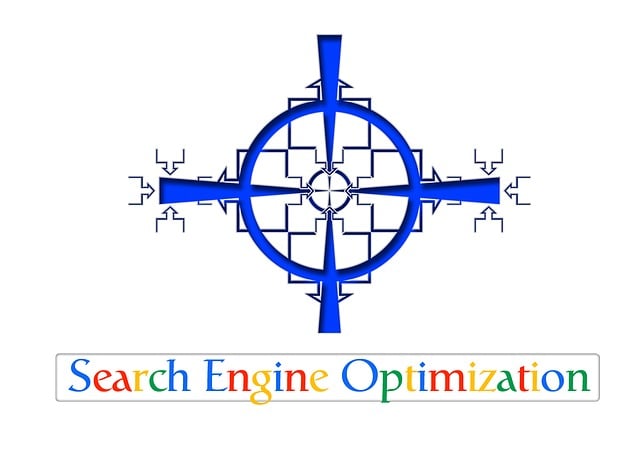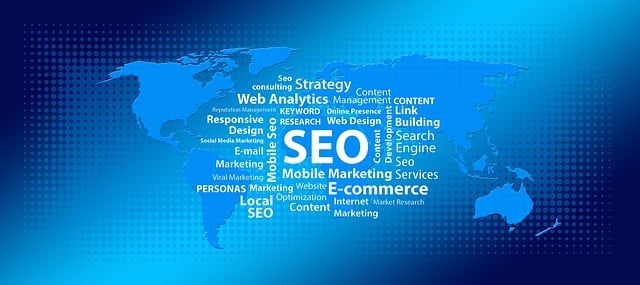Search Engine Optimization (SEO) is a powerful tool for businesses aiming to thrive online, offering numerous benefits such as increased visibility, improved user experience, higher conversion rates, and long-term brand authority. By optimizing content and websites, SEO drives organic traffic, attracts target audiences, and fosters customer loyalty. Its advantages include enhanced credibility, reduced advertising costs, and better engagement, ultimately leading to sustained business growth in a competitive digital landscape. Measuring success through KPIs allows businesses to track progress, set goals, and make data-driven decisions, ensuring their SEO strategies remain effective and relevant with evolving trends and search algorithms.
In today’s digital landscape, Search Engine Optimization (SEO) is more than just a buzzword; it’s a powerful tool for business growth. Effective SEO strategies unlock unparalleled benefits, from boosting online visibility and expanding customer reach to driving targeted traffic and enhancing user experiences. By understanding these advantages and implementing robust SEO practices, businesses can build credibility, foster trust, and ensure long-term sustainability in an ever-evolving market. This article explores the multifaceted benefits of Search Engine Optimization and why it’s an essential investment for any forward-thinking enterprise.
Understanding Search Engine Optimization (SEO) and Its Role in Business Growth

Search Engine Optimization (SEO) is a powerful strategy that plays a pivotal role in driving business growth in today’s digital landscape. It involves optimizing websites and online content to improve their visibility and ranking on search engines like Google, Bing, or Yahoo. By understanding user search behavior and tailoring content to meet these needs, businesses can attract a larger audience and ultimately increase sales and revenue.
The benefits of SEO are vast. It helps establish a strong online presence, ensuring that potential customers can easily discover the brand, products, or services offered. A well-optimized website enhances user experience, encouraging visitors to stay longer and engage more. This increased engagement leads to better conversion rates and fosters long-term customer relationships. Moreover, SEO provides a cost-effective marketing solution, allowing businesses to compete with larger rivals on a level playing field by directing organic traffic to their sites without the need for constant paid advertising.
The Direct Impact of SEO on Online Visibility and Customer Reach

Search Engine Optimization (SEO) plays a pivotal role in enhancing a business’s online visibility and customer reach. By optimizing websites for relevant search terms, businesses can ensure their online presence is noticed by potential customers actively searching for products or services they offer. This direct impact on online visibility translates into increased website traffic, as more qualified leads are drawn to the brand’s digital doorstep.
Moreover, effective SEO strategies allow companies to reach a broader audience beyond their immediate geographic boundaries. With optimized content, businesses can tap into new markets and connect with customers who might not have discovered them otherwise. This expanded customer reach fosters brand awareness, boosts sales potential, and solidifies market position in the competitive digital landscape.
How SEO Can Drive Targeted Traffic to Your Website

Search Engine Optimization (SEO) is a powerful tool that can significantly boost your business’s online visibility and drive targeted traffic to your website. By optimizing your site for search engines, you ensure that potential customers find your business when they are actively searching for products or services related to what you offer. This targeted approach means that every visitor has a higher likelihood of being genuinely interested in what your business provides, leading to increased conversion rates.
The benefits of SEO extend beyond just attracting visitors; it also helps establish your brand as an authority in your industry. When your website ranks high on search engine results pages (SERPs), it gains credibility and trust from users. This can lead to long-term customer loyalty and a stronger online presence, which are essential for sustained business growth.
Enhancing User Experience: A Key Benefit of Effective SEO Strategies

Effective Search Engine Optimization (SEO) strategies go beyond mere ranking on search engine results pages; they significantly enhance user experience, a key benefit often overlooked. By optimizing websites for speed, ease of navigation, and mobile responsiveness, businesses ensure visitors enjoy a seamless browsing journey. This, in turn, increases the likelihood of conversions, as happy users are more inclined to explore products or services and take desired actions.
Moreover, SEO strategies that prioritize user experience signal to search engines the overall quality of the website. Google and other search giants recognize that pleasant user experiences indicate valuable content, leading to higher rankings and increased organic traffic. This positive feedback loop underscores the importance of treating user experience as a core component of any robust SEO plan, ultimately driving business growth through improved online visibility and customer engagement.
Building Credibility and Trust Through Organic Search Results

In today’s digital landscape, businesses are increasingly reliant on online visibility for growth and credibility. One of the most powerful tools in a marketer’s arsenal is Search Engine Optimization (SEO), which directly impacts how a business is perceived by potential customers. When a brand consistently ranks high in organic search results, it not only attracts more website traffic but also establishes itself as an industry authority. The benefits extend beyond increased web visits; high search rankings build credibility and foster trust with consumers.
Customers are more likely to engage with and trust a business that appears at the top of relevant searches. This is because organic search results are perceived as more reliable and authentic, as they are not influenced by paid advertising. By optimizing their online presence through SEO strategies, businesses can ensure their information is easily discoverable, enhancing customer confidence in their products or services. This trust is invaluable, as it encourages conversions and fosters long-term brand loyalty.
Long-Term Sustainability: Why SEO is an Essential Investment for Businesses

In today’s digital landscape, Search Engine Optimization (SEO) is more than just a buzzword; it’s a strategic necessity for business growth. The benefits of SEO extend far beyond mere website visibility. By understanding and leveraging keywords, creating high-quality content, and ensuring technical site optimization, businesses can attract their target audience organically, leading to increased brand awareness and customer loyalty over the long term. This sustainable approach contrasts with costly, short-term advertising strategies that often burn through budgets quickly without guaranteed returns.
Investing in SEO is an investment in future success. As search algorithms continue to evolve, businesses that prioritize organic search rankings stand to gain a competitive edge. Not only does SEO drive more traffic to websites, but it also improves user experience by providing relevant, valuable content. This results in lower bounce rates and longer user sessions, which are key metrics for search engines when evaluating website quality. Ultimately, the long-term sustainability of SEO makes it an indispensable tool for any business aiming to thrive in a digital marketplace.
Measuring Success: Key Performance Indicators (KPIs) in SEO

Measuring success is a critical aspect of any marketing strategy, and Search Engine Optimization (SEO) is no exception. Key Performance Indicators (KPIs) are essential metrics that allow businesses to track their SEO efforts and understand the benefits of optimization. By defining specific KPIs, companies can set achievable goals, analyze progress, and make data-driven decisions to enhance their online visibility and attract more potential customers.
Some common KPIs in SEO include organic traffic growth, search engine rankings for targeted keywords, click-through rates (CTRs), and bounce rate. Organic traffic growth indicates the success of optimizing a website to rank higher on search engines over time. Tracking keyword rankings reveals the effectiveness of targeting specific terms relevant to the business and its audience. CTRs measure user engagement with search results, while a lower bounce rate signifies that visitors are finding what they’re looking for on the site. These KPIs collectively provide valuable insights into the overall health of a website’s SEO strategy and its impact on driving qualified leads and conversions.
Optimizing for the Future: Keeping Up with SEO Trends and Algorithm Updates

In today’s digital landscape, staying ahead in search engine rankings is crucial for business growth. To harness the full potential of online visibility, businesses must embrace dynamic SEO strategies that keep pace with evolving trends and algorithm updates. By consistently optimizing their content, websites, and overall user experience, companies can attract a broader audience and enjoy enhanced brand exposure. The benefits of Search Engine Optimization (SEO) extend far beyond increased web traffic; it also fosters trust, improves conversion rates, and drives long-term success in an increasingly competitive market.
Keeping up with the latest SEO trends ensures that businesses remain relevant and visible in their respective industries. From mobile optimization to voice search integration, algorithms are continually adapting to user preferences and technological advancements. By staying informed about these changes, companies can adjust their tactics accordingly, ensuring their online presence remains robust and effective. This proactive approach not only boosts organic reach but also positions businesses as forward-thinking leaders in their fields, ultimately contributing to sustained growth and prosperity.
